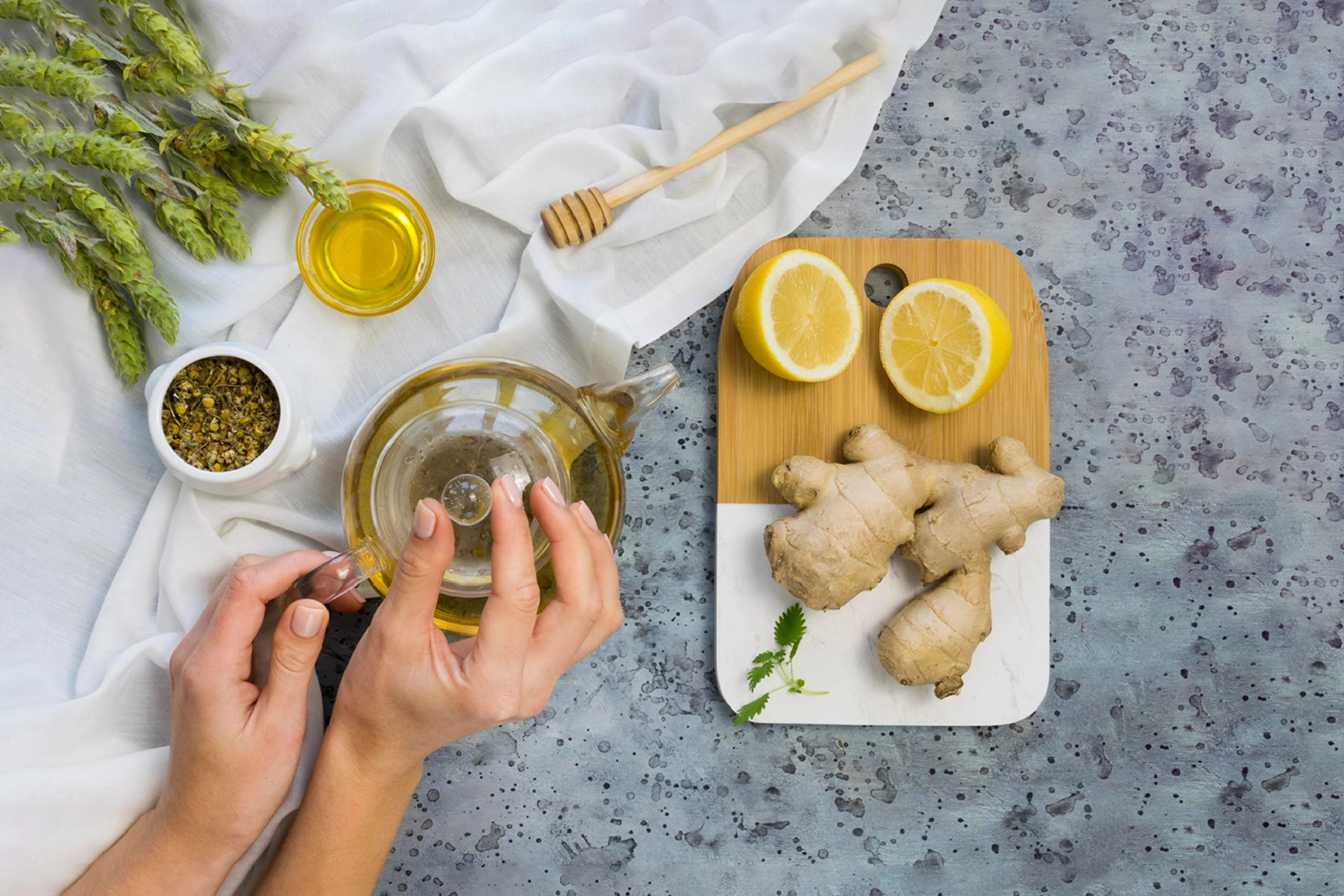Ayurveda | 8 min read
Shatavari: Nutritional Value, Benefits, Dosage, Side Effects
Medically reviewed by
Table of Content
Key Takeaways
- Shatavari is found in India, Nepal, Sri Lanka and the Himalayas
- Shatavari benefits your respiratory system and improves immunity
- Researchers discovered the antioxidant Racemofuran In shatavari
Shatavari, also known as asparagus racemosus, has been a part of Indian ayurvedic medicine for centuries. You can find it throughout India, Sri Lanka, Nepal, and the Himalayas. It is an adaptogenic herb and it regulates various systems in the human body. Shatavari benefits in coping with physical and emotional stress.
Some Ayurvedic texts suggest that Shatavari is the queen of herbs as it promotes love and devotion [1]. The dried roots of the herb are used medicinally and can be a rejuvenating tonic for women [2]. Shatavari for women is beneficial for promoting fertility and vitality. Read on to know more about the Shatavari benefits and associated risks.
What is Shatavari Powder?
An all-natural medicinal approach called Ayurveda has roots in India and dates back over 3,000 years. Ayurvedic practitioners frequently use Shatavari powder. The environment and the mind, body, and spirit are encouraged to coexist in harmony by Ayurveda.
Shatavari powder is made from the roots of the plant Asparagus racemosus. This is similar to the Asparagus Officinalis found at your local food store, but it is not the same plant. Asparagus racemosus is native to India.
The herb Shatavari is apoptogenic. These herbs aid in modulating the hormones produced by the brain, pituitary, and adrenal glands. Like all apoptogenic herbs, Shatavari can help your body handle stress and enhance your general health.
Nutritional Value of Shatavari:
The following are the nutritional values of Shatavari Powder.
- Crude Protein – 7.8 %
- Carbohydrates- 3.72 %
- Total fat is less than 1
- Crude fibre- 28.9 %
- Energy – 180 kcal/100 g
Shatavari Benefits
Helps in the treatment of diarrhoea:
Shatavari is a traditional treatment for diarrhoea. Serious issues, including electrolyte imbalance and dehydration, can result from diarrhoea. Shatavari helps the body balance these issues. Shatavari helped halt castor oil-induced diarrhoea in rats, according to a 2005 study. More research is needed to determine whether Shatavari produces equivalent outcomes in people. [1]
Shatavari benefits in ulcer healing:
The stomach, small intestine, or oesophagus can all develop ulcers. They can be excruciatingly uncomfortable. In addition, ulcers can cause significant side effects such as bleeding or perforation. Shatavari was found beneficial in healing medication-induced stomach ulcers in 2005 research on rats.
Shatavari benefits in kidney stone therapy:
Kidney stones are hard deposits in the kidneys. As they pass through your urinary tract, they might cause excruciating pain. Oxalates are the main component of kidney stones. Oxalates are organic compounds that may be discovered in foods, including spinach, beets, and French fries. Shatavari root extract was found to support inhibiting the production of oxalate stones in rats in 2005 research. Additionally, it increased the level of magnesium in the urine. The presence of magnesium in the body aids in preventing the kidney-stone-causing crystallisation of urine.
It may aid in blood sugar control:
The prevalence of type 2 diabetes is increasing, and so is the demand for safer, more effective therapies. Shatavari may help to manage blood sugar levels, according to 2007 research. Although the precise process is not known, plant compounds may encourage the manufacture of insulin. [2] Although further study is required, researchers think understanding how Shatavari impacts blood sugar levels may be crucial to creating new diabetic treatments.
It might be anti-ageing:
Shatavari may be one of nature's greatest anti-ageing secrets. 2015 research found that the saponins in the Shatavari plant helped prevent the free-radical skin damage that causes wrinkles. Shatavari also helps to inhibit collagen breakdown. This collagen keeps skin subtle. Before topical Shatavari products may be offered, more studies must be done. However, some scientists believe they represent the future of safe anti-ageing skin care.
Additional Read: Ayurvedic Diet Foods
Offers antioxidant and anti-inflammatory properties:
This is rich in saponins, compounds that offer antioxidant benefits. It helps prevent cell damage from free radicals and fights oxidative stress. A study on shatavari discovered a new antioxidant named racemofuran along with asparagamine A and racemosol [3]. Racemofuran has anti-inflammatory abilities and works just like anti-inflammatory drugs without severe digestive side effects.
Acts as a natural diuretic:
A study found that 3,200 milligrams of this had diuretic benefits on rats with no acute side effects [4]. It assists your body to get rid of excessive fluids. For instance, a diuretic can remove excess fluid from around the heart in people with congestive heart failure. Apart from this, diuretics help you against urinary tract problems and other infections. Consuming it regularly can help cure kidney stones.

Shatavari benefits in respiratory health:
Taking care of your respiratory health is important to prevent bronchitis and breathing problems. Consuming its root juice has the following respiratory health benefits.
Acts as a cough remedy
Helps lessen respiratory tract problems
Reduces asthma symptoms
Relieves stress, anxiety, and depression
When learning how to relieve stress, shatavari is surely one to consider. This herb can boost your immune health and relax your mind and body. Ayurveda also recommends this supplements to fight anxiety and depression.
Shatavari benefits to improve immune system:
A strong immune system is required to fight off infectious bacteria, viruses, and fungi. Researchers have found that it can act as an immunity booster. A study on animals found that shatavari increased antibodies against a strain of cough. The animals treated with shatavari root showed the following improvements.
The treatment reduced their mortality
It improved overall health
They recovered faster than animals not treated with shatavari
Contributes to a healthy reproductive system in women
One of the most common uses of shatavari is to treat reproductive disorders in females. As per a 2018 review, shatavari may help improve hormonal imbalances and PCOS [5]. Studies have also found that shatavari in combination with other herbal medicines can reduce the symptoms of menopause [6]. Finally, it can increase the chances of conception as it helps treat fertility problems.
Additional Read: Ayurvedic Treatment for PCOS
How to Use Shatavari?
You may get Shatavari powder on the internet or at your neighbourhood health food store. Shatavari is available in both capsule and loose powder form.
Traditionally, water at room temperature is combined with Shatavari powder. The flavour of Shatavari powder is somewhat harsh yet sweet. You can combine it with milk or juice if you don't like its taste with water. Additionally, you may make a smoothie out of it.
There is no scientifically proven dosage range. Your age, weight, health, and other factors will all be considered when determining your correct dosage. Begin with a little dose to observe how your body reacts to it. Shatavari powder is typically taken twice daily at a dose of 500 mg.
Several diseases are treated using Shatavari powder. Early scientific studies on Shatavari, which has been utilised in ancient medicine for hundreds of years, are now promising. However, Shatavari, the "curer of a hundred illnesses", should be approached with care because of a lack of regulation and insufficient human trials.
Precautions to Take with Shatavari:
For Pregnancy:
There is insufficient data to determine if eating asparagus racemosus is safe during pregnancy or breastfeeding. To be on the safe side, get medical advice before using it.
Allergy to related plants, such as onions, leeks, and garlic:
Asparagus racemosus may cause an allergic reaction in those sensitive to other members of the liliaceae family, such as onions, leeks, garlic, and chives.
Shatavari Risks
More human research is required to corroborate the results of several animal studies that suggest Shatavari may have health advantages.
Allergy to Asparagus
Avoid Shatavari powder if you have a hay fever reaction to asparagus.
Inter-drug Interactions
Shatavari powder's interactions with other medications and dietary supplements could be clearer. So if you're on medicine, proceed with caution.
Alterations in Oestrogen
Phytoestrogens are present in Shatavari powder. Phytoestrogens can alter the level of oestrogen in your body. Phytoestrogens have been shown in certain studies to have the potential for treating diseases like breast cancer, but they can also cause other diseases like uterine fibroids worse.
Lack of supervision
Shatavari powder is one example of a dietary supplement not subject to the same regulations as other medications. As a result, there can be a range in supplements' purity, potency, and quality. Before you may purchase a supplement, only a little testing is necessary. Shatavari powder should only come from reliable suppliers.
Interaction With Other Drugs
Lithium and Shatavari interactions:
Asparagus racemosus may have a diuretic effect. In addition, taking Asparagus racemosus may make it harder for the body to get rid of lithium. The body's lithium level may rise, which might have serious adverse effects. If you use lithium, see your doctor before taking this product. Your lithium dosage may need to be changed for you to take Shatavari.
Shatavari and diuretics Interactions:
Research has indicated that asparagus racemosus lowers potassium levels. Potassium levels can also be decreased by diuretics, popularly known as "water pills." Potassium levels may dangerously drop when asparagus racemosus is taken with "water tablets." [3]
Shatavari Side Effects
There need to be more studies into the consequences of Shatavari on people. Anyone who consumes the medication faces certain dangers. The Food and Drug Administration (FDA) does not regulate the doses or recommendations for this supplement in the United States. The supplement may also cause low blood sugar. People on blood sugar-lowering medicines or herbal treatments should avoid using Shatavari.
This herb is usually considered safe to consume. However, people with allergic reactions should avoid taking this herb. It may cause:
Rashes
Itchy skin
Itchy eyes
Dizziness
Fast heart rate
Breathing difficulty
Also, this herbs can make problems worse in people with kidney or heart disorders. Some people may experience weight gain. Do not take shatavari along with other herbs or supplements as it has diuretic effects. It can lead to dehydration and lower blood sugar. If you experience any symptoms after consuming it, seek immediate medical help.
Here are a few ways you can take shatavari:
- Shatavarichurna or shatavari powder
Tablets
Liquid form
However, consult with your doctor about its dosage before consuming it. Alternatively, you can book an online doctor consultation on Bajaj Finserv Health. Talk to the best AYUSH specialists for advice on shatavari benefits and uses for you.
References
- https://www.ncbi.nlm.nih.gov/pmc/articles/PMC4027291/
- https://www.researchgate.net/publication/258448671_Asparagus_racemosus_Shatavari_A_Versatile_Female_Tonic
- https://pubmed.ncbi.nlm.nih.gov/15478181/
- https://www.mona.uwi.edu/fms/wimj/article/1154
- https://pubmed.ncbi.nlm.nih.gov/29635127/
- https://www.sciencedirect.com/science/article/abs/pii/S2210803318300010
Disclaimer
Please note that this article is solely meant for informational purposes and Bajaj Finserv Health Limited (“BFHL”) does not shoulder any responsibility of the views/advice/information expressed/given by the writer/reviewer/originator. This article should not be considered as a substitute for any medical advice, diagnosis or treatment. Always consult with your trusted physician/qualified healthcare professional to evaluate your medical condition. The above article has been reviewed by a qualified doctor and BFHL is not responsible for any damages for any information or services provided by any third party.





